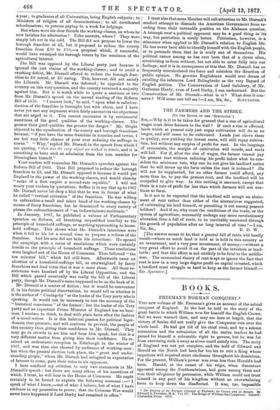THE FARMERS AND THE STRIKE.
TO THE EDITOR OF THE ..spscre:ros..1 S111,—Why is it to be taken for granted that a rise of agricultural wages must drive farmers to the wall ? If such a rise is effected, lands which at present only just repay cultivation will do so no longer, and will cease to be cultivated. Lands just above these in quality, now yielding the lowest rents, will still repay cultiva- tion, but, without any surplus of profit for rent. In the language of economists, the margin of cultivation will recede, and rents will fall. For if, after the rise of wages, the farmer cannot pay his present rent without reducing his profit below what he con- siders the minimum rate, why can he not give his landlord notice that he will throw up the farm unless the rent is reduced ? He will not be supplanted, for no other farmer could afford, any more than he, to pay the present rent, and the landlord will be compelled to give way. In this nothing is assumed, except that there is a rate of profit for less than which farmers will not con- tinue to farm.
Is it not to be expected that the landlord will accept an abate- ment of rent rather than either of the alternatives suggested, of cultivating his land himself, or parcelling it out among peasant holders? And if so, why must the conditions of the trade, or the system of agriculture, necessarily undergo any more revolutionary alteration than a fall of rents, to be inevitably recovered through the growth of population after no long interval of time ?—I am,
[The answer seems to be, that a general fall of rents will hardly result—where so much land'is held as is held in this country as an investment, and a very poor investment, of money,—without a very great effort to avoid it on the part of the investors or land,- lords ; and that this effort is not unlikely to be fatal to the middle- men. The economical theory of rent is apt to ignore the fact that rent is now in a very large degree profit on capital invested, which a landlord must struggle as hard to keep as the farmer himself.— ED. Spectator.]


































 Previous page
Previous page